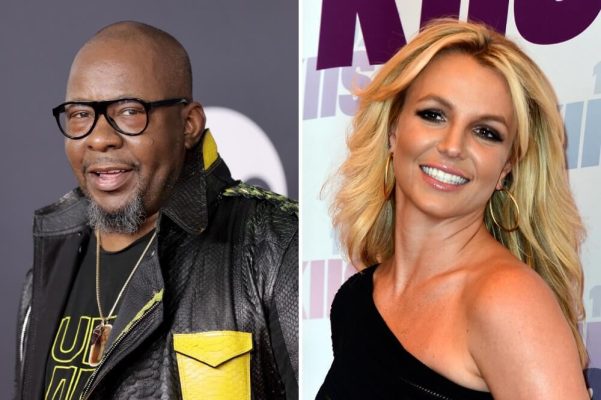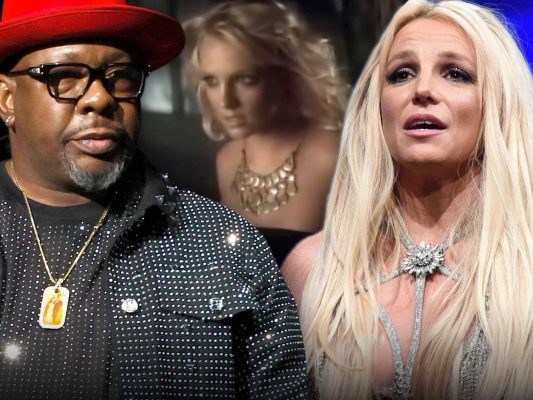world news
Bobby Brown Slams Britney Spears’ Cover of ‘My Prerogative’: A Deep Dive into the Conflict
Introduction:
Bobby Brown, the celebrated R&B artist and former New Edition member, recently made headlines with a bold statement regarding Britney Spears’ cover of his 1988 hit, “My Prerogative.” Released as part of her 2004 greatest hits collection, Spears’ rendition was meant to be a tribute to Brown’s classic song. However, Brown did not hold back in criticizing the cover, calling it a “butchering” of his original work. In a candid conversation on the Club Shay Shay podcast, Brown explained why he felt so strongly about the remix and how the experience has influenced his approach to letting other artists sample his music. This article explores the dynamics of Brown’s reaction, the impact of the original song, and how music sampling and reinterpretations often lead to controversy in the entertainment world.

Bobby Brown’s Reaction: A Passionate Critique
Bobby Brown’s reaction to Britney Spears’ cover of “My Prerogative” was far from a neutral one. On the Club Shay Shay podcast, Brown expressed that he felt his original song was not given the respect it deserved. He described the cover as a “butchering” of his 1988 hit, a strong word for an artist who had poured his heart and soul into the creation of the song. According to Brown, the samples used in Spears’ version of the track were poorly executed, which, for him, made the entire cover less impactful.
Brown was particularly vocal about the involvement of producer Teddy Riley, whom he had trusted to work on the original track. Despite Riley’s involvement in the remake, Brown maintained that the final product failed to do justice to his vision. “I couldn’t take it,” he stated, revealing his deep dissatisfaction with how the cover turned out. This passionate critique from Brown sheds light on the sometimes fraught relationships between original artists and those who reinterpret their work.
The Original Song’s Legacy and Its Significance
“My Prerogative” was a defining song in Bobby Brown’s career, catapulting him to solo success after his departure from New Edition. Written as a public declaration of independence, the song became an anthem of self-determination, with its catchy chorus and bold message resonating deeply with fans. The track reached number one on the Billboard Hot 100 and was a key single from his second album, Don’t Be Cruel.
The song’s success not only solidified Brown as a solo artist but also helped establish him as one of the most influential R&B stars of the late ’80s and early ’90s. The combination of Brown’s signature vocals and Teddy Riley’s innovative production, which merged new jack swing with classic R&B, made “My Prerogative” a timeless hit. Its enduring popularity paved the way for later artists to reimagine and cover the song, leading to the decision for Britney Spears to put her own spin on it years later.

Britney Spears’ Cover: Intent and Reception
When Britney Spears released her cover of “My Prerogative” in 2004 as part of her Greatest Hits: My Prerogative album, the intention was likely to honor the legacy of a song that had left an indelible mark on pop culture. However, her version of the track took a markedly different approach compared to the original. Spears’ rendition featured a more electronic and pop-centric sound, which some fans and critics appreciated for its modern take on the classic. It became one of the standout tracks of the album, reaching number one on the Billboard Hot 100.
Despite its commercial success, Spears’ cover did not sit well with Bobby Brown, whose personal attachment to the song made the reimagined version hard to swallow. While Spears’ rendition was widely accepted by the general public, it was clear that the emotional connection to the original song was lost on Brown, whose memories of the track are tied to his journey in the music industry and the personal meaning it held for him. This difference in perspective is not uncommon in the music industry, where covers and reinterpretations can often spark differing opinions among the original artists and their fans.
The Complexities of Sampling and Covering Classic Hits
Bobby Brown’s criticism highlights a common issue in the music industry: the complexities of covering or sampling classic songs. While it’s common for newer artists to pay homage to older tracks by creating their own versions, the process of reinterpretation can lead to tensions between the original creator and the artist who reworks the material. This can happen in a variety of ways—from disagreements over the treatment of the song to differences in artistic vision.
In some cases, artists like Brown are deeply protective of their work and feel that covers fail to capture the essence of the original. On the other hand, newer artists may see covers as an opportunity to inject their own identity into a well-known piece of music. In the case of “My Prerogative,” Spears’ version was clearly intended as a tribute, but the divergence in sound and style was too stark for Brown to accept. This dynamic speaks to the broader tension in the music industry, where the line between homage and creative misstep can sometimes be hard to define.
Oklahoma State Cowboys – Stilly Them Boys From Oklahoma 3D T-Shirt
Lessons Learned: Caution in Licensing Music
Following his experience with Spears’ cover, Bobby Brown admitted that the criticism made him more cautious about allowing his music to be used by other artists in the future. While he cleared the sample for Spears’ rendition of “My Prerogative,” he now emphasizes the importance of carefully considering how his music is used and ensuring that any reinterpretation aligns with his artistic values. Brown’s shift in perspective underscores the significance of maintaining control over one’s creative output, particularly when it’s being altered or reimagined by someone else.
This lesson in cautious licensing is not unique to Bobby Brown. Many artists are careful about who they allow to sample or cover their music, especially when the original track holds personal or professional significance. While collaborations and creative reinterpretations can lead to exciting new music, it’s also important for artists to protect their legacy and ensure that their work is represented in a way that aligns with their vision. Brown’s experience serves as a reminder of the delicate balance between artistic freedom and the preservation of one’s creative identity.
Conclusion: A Tale of Artistic Integrity and Perspective
Bobby Brown’s critique of Britney Spears’ cover of “My Prerogative” serves as an insightful commentary on the complexities of artistic ownership and the challenges that arise when iconic songs are reinterpreted by other artists. While Spears’ version of the song was a commercial success and received praise from many, it was clear that it didn’t resonate with Brown, whose personal connection to the track shaped his response.
This ongoing conversation between original artists and those who reinterpret their work highlights the importance of respect and understanding in the music industry. It also underscores the significance of maintaining artistic integrity, whether through controlling how one’s music is used or by being mindful of the legacy of the songs that paved the way for future success. In the case of Bobby Brown, his candid reaction to Spears’ version of “My Prerogative” reveals the deeper emotional ties that artists often have with their work, reminding us of the timeless power of music and the personal connections that shape it.
From lydiancustomtee

